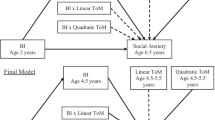
Overview
- Synthesizes research on behavioral inhibition (BI) using biological, psychological, and social markers of development
- Discusses associations between BI and psychopathology (e.g., anxiety) across childhood and adolescence
- Outlines the ways in which BI research can shape the design and implementation of evidence-based treatments
- Examines the role early social development has on adolescent and adult patterns of functioning
Access this book
Tax calculation will be finalised at checkout
Other ways to access
About this book
Key areas of coverage include:
- Animal models of behavioral inhibition.
- Social functioning and peer relationships in BI.
- Attention mechanisms in behavioral inhibition.
- BI and associative learning of fear.
- Behavioral inhibition and prevention of internalizing distress in early childhood.
- The relations between BI, cognitive control, and anxiety.
Behavioral Inhibition is a must-have resource for researchers, clinicians, scientist-practitioners, and graduate students across such fields as developmental psychology, psychiatry, social work, cognitive and affective developmental neuroscience, child and school psychology, educational psychology, and pediatrics.
Similar content being viewed by others
Keywords
- Amygdala model of BI
- Behavioral inhibition (BI) as a model system
- Behavioral inhibition and animal models
- Behavioral inhibition and psychopathology
- Behavioral inhibition theory and history
- Biological markers and behavioral inhibition
- Child development and behavioral inhibition
- Cognition and behavioral inhibition
- Development and behavioral inhibition
- Developmental trajectories and behavioral inhibition
- Environmental conditions and BI
- Environmental threats and BI
- Evolutionary mechanisms and behavioral inhibition
- Jerome Kagan and behavioral inhibition
- Neural mechanisms of behavioral inhibition
- Peer relationships and BI
- Psychophysiology and behavioral inhibition
- Rodent model and BI
- Social anxiety, social withdrawal, and BI
- Temperament and behavioral inhibition
Table of contents (16 chapters)
-
Front Matter
-
Back Matter
Editors and Affiliations
About the editors
Koraly Pérez-Edgar, Ph.D., is the McCourtney Professor of Child Studies and a Professor of Psychology at The Pennsylvania State University. She received her A.B. from Dartmouth College and Ph.D. from Harvard University. Dr. Pérez-Edgar’s research focuses on the relations between temperament and psychopathology. In particular, she examines how individual differences in attention can work to ameliorate or exacerbate risks associated with early temperament traits. Dr. Pérez-Edgar is a fellow of the Association for Psychological Science.
Nathan A. Fox, Ph.D., is a Distinguished University Professor of Human Development at the University of Maryland. He received his B.A. from Williams College and Ph.D. from Harvard University. Dr. Fox is a world-recognized leader in the study of early behavioral inhibition, the impact of early life events on development, and the biological underpinning of development. Dr. Fox is a Fellow of the American Association for the Advancement of Science, the Association for Psychological Science, and the American Academy of Arts and Sciences.
Bibliographic Information
Book Title: Behavioral Inhibition
Book Subtitle: Integrating Theory, Research, and Clinical Perspectives
Editors: Koraly Pérez-Edgar, Nathan A. Fox
DOI: https://doi.org/10.1007/978-3-319-98077-5
Publisher: Springer Cham
eBook Packages: Behavioral Science and Psychology, Behavioral Science and Psychology (R0)
Copyright Information: Springer Nature Switzerland AG 2018
Hardcover ISBN: 978-3-319-98076-8Published: 01 October 2018
Softcover ISBN: 978-3-030-07447-0Published: 19 January 2019
eBook ISBN: 978-3-319-98077-5Published: 22 September 2018
Edition Number: 1
Number of Pages: XV, 380
Number of Illustrations: 4 b/w illustrations, 9 illustrations in colour
Topics: Developmental Psychology, Child and Adolescent Psychiatry, Social Work



